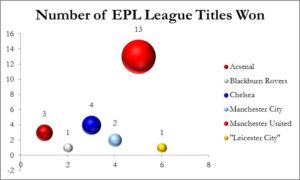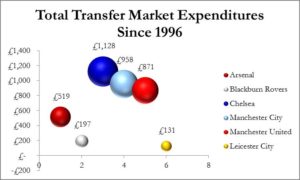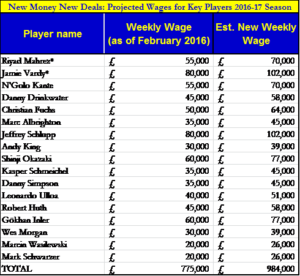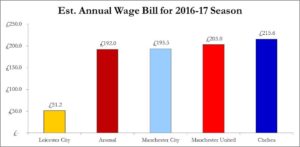Introduction
With Leicester City on the verge of winning the Premier League title, a lot has been made about their title run this year. The New York Times recently revered Leicester’s title campaign as “Soccer’s Most Remarkable Season” (see link here). The Guardian recently called Leicester’s campaign the “Greatest Underdog Story Ever Told” (see link here).
In the modern era of the Premier League, since 1992 there have only been 5 teams to win the league[1]:
- Arsenal (3x champion): 1997-98, 2001-02, 2003-04
- Blackburn Rovers(1x champion): 1994-95
- Chelsea (4x champion): 2004-05, 2005-06, 2009-10, 2014-15
- Manchester City (2x champion): 2011-12, 2013-14
- Manchester United (13x champion): 1992-93, 1993-94, 1995-96, 1996-97, 1998-99, 1999-00, 2000-01, 2002-03, 2006-07, 2007-08, 2008-09, 2010-11, 2012-13
- “Leicester City” (1x champion): 2015-16 (pending)
The past 20 years, The Big Four of Arsenal, Chelsea, Manchester City, and Manchester United have spent a combined £3.48 billion in the transfer markets which has led to one of the Big Four winning 96% of the Premier League titles (22 of the 23) since 1996[2].
Looking to the future, as Leicester City stands on the brink of breaking this dominance and making Premier League history much in the same manner that Blackburn Rovers did in 1994-95, the question remains can they sustain their excellence much in a way that Blackburn Rovers was unable to do?
What Happens Next? A Mass Exodus of Players?
There is simply no question that Leicester City’s success this year has been remarkable and as a fan of sports I have to admit that I found myself rooting hard for them each week. But a direct result of this success has been a significant increase in the valuations of most of their players. And this increase in valuation leads to increased interest from the Big Four clubs.
This season alone, Leciester City’s core group’s value (as shown below) has risen an estimated 84.9% this year[3]:
After Blackburn Rovers won the league there was a mass exodus of players, and their results began to slip. Four years later, Blackburn Rovers were relegated from the Premier League to Division One in the 1998-99 campaign. In a similar vein to Leicester City, Blackburn Rovers saw their player valuations skyrocket, and they were unable to avoid being pulled part by the bigger clubs who could afford to repeatedly break transfer and wage records to lure star players away. And based on recent reports regarding N’Golo Kante (see here) the summer exodus may be on its way…
Champions of England = More Money for Key Players… But Will it Be Enough?
By winning the Premier League, Leicester City stand to pocket roughly £90.6 million which is +27% more than they pocketed last year for their 14thplace finish (£71.6 million)[4]. Given this windfall, there would be room for Leicester City to comfortably increase their annual wage bill on their Key Players from £40.3 million to £51.2 million.
The following key players’ new wages would look something like this (assuming everyone got their equal share):
But even at these elevated levels, the weekly wages are far less than the wages being paid at the Big Four. Specifically, this coming year alone, Chelsea, Manchester United, Manchester City, and Arsenal will have estimated annual wage bills of £216, £203, £194, £192 million respectively.
On average, the Big Four have the ability to pay anywhere from 3.8x to 4.2x what Leicester City can pay. Given this, the Big Four could easily pay someone like Jamie Vardy, N’Golo Kante , or Riyard Mahrez £140,000 per week. Shit, Chelsea currently pays Diego Costa and Eden Hazard £185,000 and £200,000 per week to come in 10th.
Even though Leicester City will be playing in Champions League next season, I don’t believe it will be enough to keep their squad intact. For players like Jamie Vardy, N’Golo Kante, and Riyard Mahrez, they will be able to more than double their weekly wages at any of the Big Four clubs (if their intent is to stay in England). Money talks far more than Tuesday night’s in the Champions League.
So while I don’t predict the same massive exodus of all of players that occurred at Blackburn Rovers after the 1994-95 season, Leicester City will see some turnover in key positions for which, they will be highly compensated (I estimate that the transfers of Vardy, Kante, and Mahrez will easily net Leicester City £85.7 to £104.3 million).
But Leicester City is Different to Blackburn Rovers in One Key Way?
Given the significant valuation increases and the lack of weekly wages compared to the Big Four clubs for their key players, it seems on paper that Leicester City will struggle to keep their key players much in a similar fashion to Blackburn Rovers. But Leicester City is different to Blackburn Rovers in one key way: The Foxes have a Thai billionaire owner
In 2010, Leicester City was bought for £39 million by Vichai Srivaddhanaprabha, a Thai billionaire owner:
For those of you that have watched Leicester City this year, you may or may not have seen his helicopter on the pitch at King Power Stadium at the end of each match:
But more importantly than his fashionable helicopter, Vichai Srivaddhanaprabha has BIG ambitions for Leicester City even before this season. He declared after the 2013-14 season, he would willingly spend £180 million to break into the top 5 in the next three years, and since he bought the club, Leicester City have spent roughly £77 million on transfers. To put this in some perspective, since 1996 Leicester City have spent a grand total of £131 million on transfers.
So unlike Blackburn Rovers, Leicester City has a very rich owner that is on par with some of the bigger clubs. And when all is said and done, Vichai Srivaddhanaprabha will willingly dig into his deep pockets in an attempt to build upon the success of the 2015-16 campaign. With an estimated net worth of $2.9 billion[5]Khun Vichai, as he is often called, will be the reason Leicester City don’t disappear in the similar fashion that Blackburn Rovers did many decades ago.
Enjoy the Leicester City miracle for what it truly is… an underdog story but be prepared… The Foxes aren’t disappearing anytime soon.
[1]TOTALSPORTEK2. “List of English Premier League Winners Since 1992.” 15 Aug. 2015. Web Retrieved 30 Apr. 2016
[2] http://www.transfermarkt.co.uk/
[3] THE MIRROR. “Football Manager reveals staggering amount Leicester City’s title chasers’ value has rocketed this year.” 18 Feb. 2016. Web Retrieved 30 Apr. 2016









